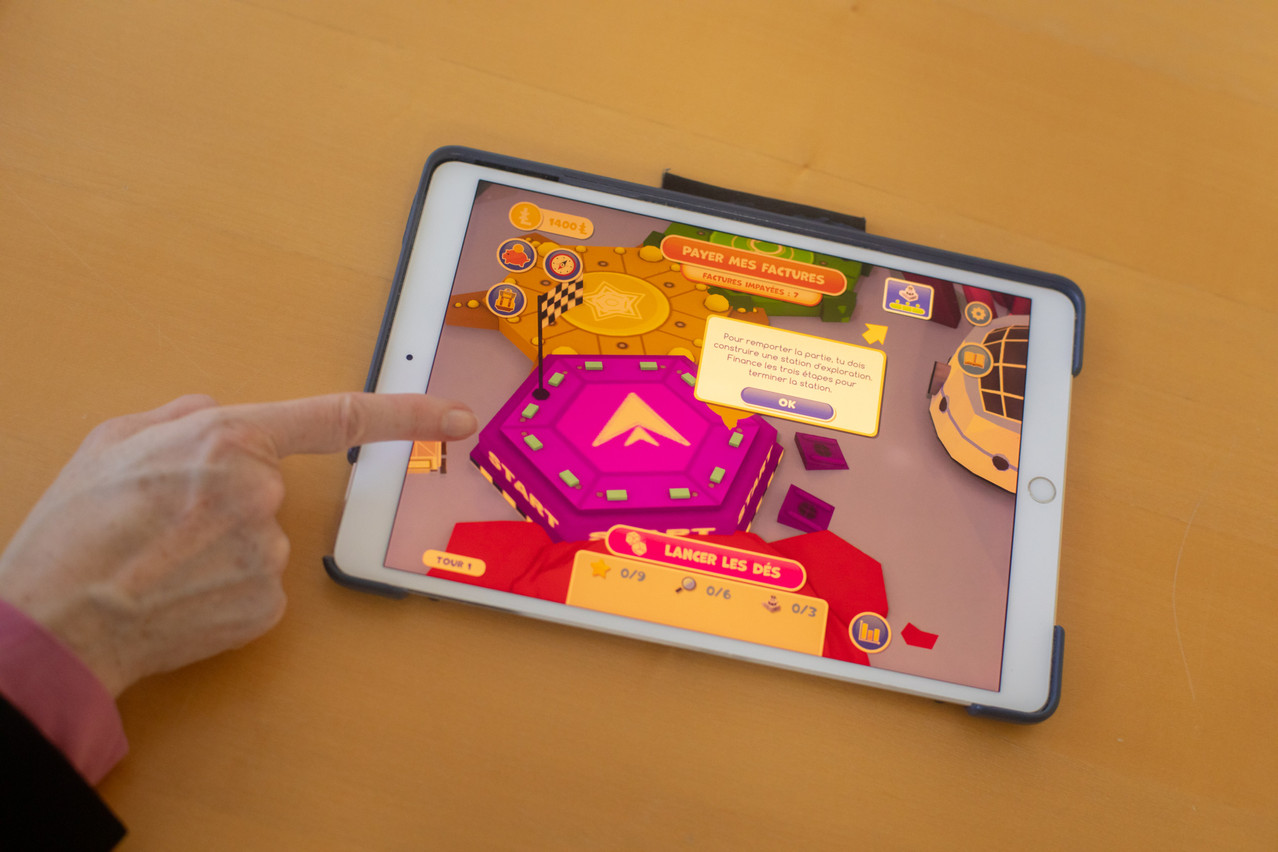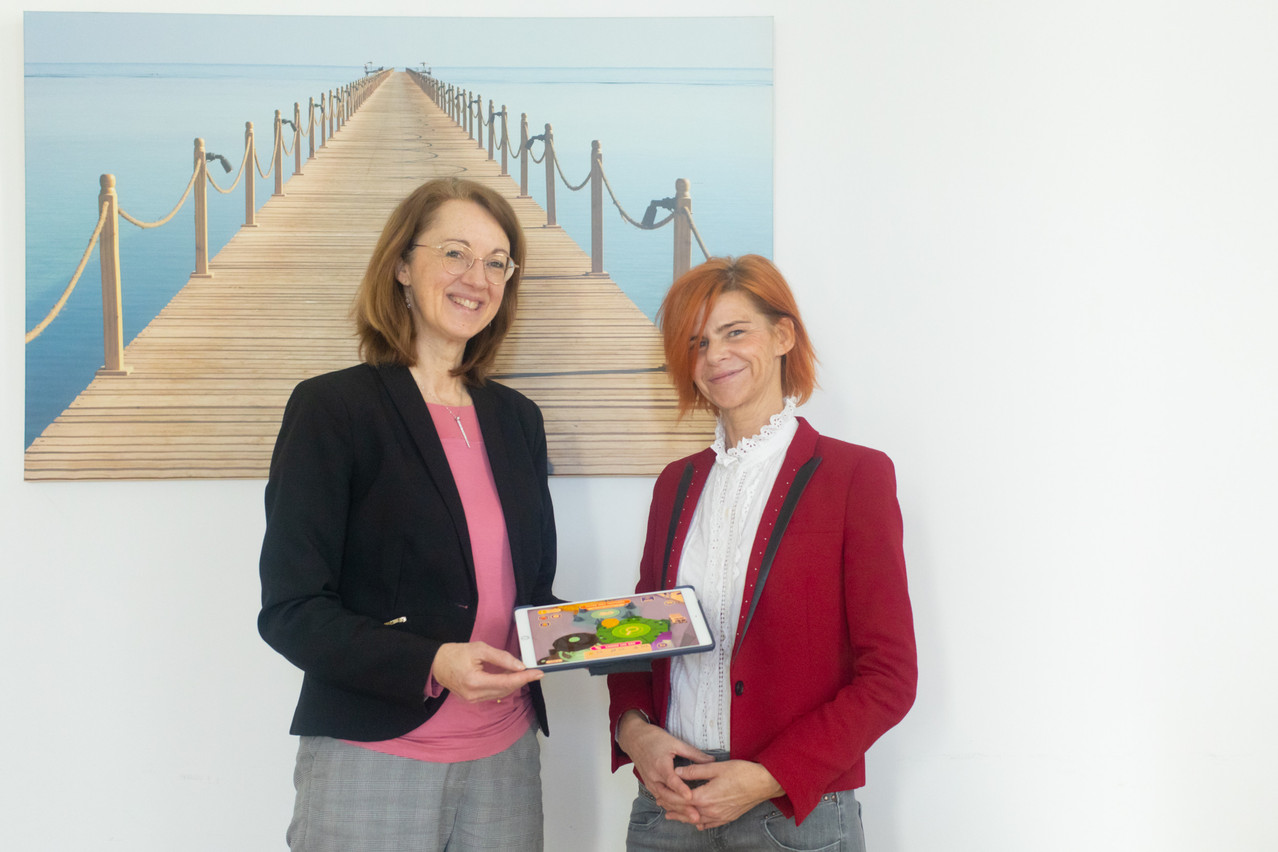Colourful graphics, an adorable round-headed character, fun quests and a spacey soundtrack--at first sight, the Fondation ABBL’s new educational app seems distant from the more straightlaced, navy blue world of finance. Upon closer inspection though, this financial education game makes topics like cryptocurrencies, sustainable finance and thinking about money digestible--fun, even--for children and adults.
Over two years of work
The latest product issued by the banking union’s foundation to fight financial illiteracy comes in the shape of a free app that mixes components of Trivial Pursuit with Monopoly. Two years since starting this odyssey, the foundation on 24 March will officially present its game, though it is already available in .
Money Odyssey was developed in collaboration with Luxembourg-based developer Virtual Rangers, and mainly sponsored by the Chamber of Commerce. The project was and continues to be expensive, Delano was told in an interview, as feedback from previous beta testing is leading to further improvements. While it cost “a lot”--no further details on the development budget were given--it is worth every single penny for the people behind the concept.
The idea is to sensitise them while they’re young to the fact that the money they have is a determined sum and that they can’t spend indefinitely.
Exchanges with youths and adults of different backgrounds--through the multitude of educational programmes they offer, like the annual Money Week--or by talking to university students made the foundation realise that “when they have their first experiences with money, there are three reactions: some panic and are defensive with their spending, others feel like their money is infinite, and then a third group is more responsible and might consider investing,” explains Catherine Bourin, a member of the ABBL management board. Bourin worked with the ABBL’s financial education adviser Jessica Thyrion on developing a concept that would go beyond the courses organised by the foundation, and beyond the pamphlets it was already handing out.
Picking the right topics and audience
“All players in Luxembourg and elsewhere are faced with this problem [of financial illiteracy]--[the taboo on finances] is one of the obstacles to promoting it,” said Thyrion. There was and is still a serious knowledge gap, not just among children but also in adults, who then can end up in financially difficult situations. So while the app caters to all ages, “the idea is to sensitise them while they’re young to the fact that the money they have is a determined sum and that they can’t spend indefinitely.”
The advantage of a tool like this one compared to [our previous] pamphlets, is that pamphlets focus on knowledge, whereas this app focuses also on the behavioural aspect too.
With a working group, which included teachers, the duo set out to gather knowledge of the ABBL’s specialist advisors and render it more accessible for children and adults with little to no knowledge on the matter. Different topics covered in the game are the role of a bank, financial scams and cybersecurity, sustainable finance, insurance, budget management, loans and credit, money laundering, payment types, investments and cryptocurrencies.
Though an for financial skills in adults published by the OECD in January 2022 reassured Bourin and Thyrion in terms of the content they had prepared for their diverse audience, they had to think about making it interesting for all. “The advantage of a tool like this one compared to [our previous] pamphlets, is that pamphlets focus on knowledge, whereas this app focuses also on the behavioural aspect too,” explains Bourin. Things like prioritising needs over wishes are covered here, for instance.
But what is it?
In Money Odyssey, you are an alien character who, like humans, has monthly wages, bills to pay, but also a more expensive building project to complete on the planet “Greeneria”. But why choose space of all places? The pair told Delano they wanted a neutral environment, space, and currency to make the app more accessible, even beyond the original borders of their project, Luxembourg. To gain money--Lumix is the currency on this planet--you have to throw (virtual) dice, progress on a circuit that mixes elements of Monopoly and Trivial Pursuit, gather knowledge and answer questions. Every correct answer to a question is then transferred to a book of knowledge the player can return to as many times as they want.
Interestingly, the game incorporates the importance of putting money aside in a savings account--with higher interest rates--or placing it in insurance or investments that can protect you or bring you closer to the sums needed for the building project. Money Odyssey also brings awareness to risks linked to various financial products. Thyrion says: “When you consider that some children of 10-12 y.o. know about cryptocurrencies, this is also about bringing awareness to the risks linked to this too.”

Players, like in Monopoly, fall on different fields which either test their financial knowledge, recommend investments and insurance products, or put them face-to-face with unexpected costs due to incidents. Photo: Matic Zorman / Maison Moderne
Other interesting aspects of the game: players can choose their level of difficulty--either ‘child’ or ‘adult’, the financial topics they want to focus on, and turn the game into a solo or multiplayer adventure.
So far, feedback from students, teachers and other adults has been mainly positive, with some comments on making the app an online game to allow players to play on separate devices, or on putting up the cost of life on Greeneria to make it a more challenging game.
The app is currently available in French, with a German version following in March and English and Portugese versions to be released in April.
This article was published for the Paperjam+Delano Finance newsletter, the weekly source for financial news in Luxembourg. .
